|
|
Brandenburg Concertos BWV 1046-1051
Conducted by Nikolaus Harnoncourt |
|
O-2 |
J.S. Bach: Brandenburg Concertos |

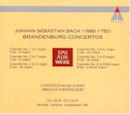 |
|
Brandenburg Concertos BWV 1046-1051 [22:54, 13:54 11:44, 16:49, 23:06, 16:44] |
|
Nikolaus Harnoncourt |
|
Concentus Musicus Wien |
|
- |
|
Teldec 77611 |
Apr 1964 |
2-CD / TT: 85:11 |
|
Recorded at Palais Schönburg, Vienna, Austria.
1st recording of Brandenburg Concertos BWV 1046-1051 by N. Harnoncourt.
Buy this album at:
2-CD: Amazon.com |
|
O-3 |
J.S. Bach: Brandenburg Concertos Nos. 1-6; Suites Nos. 2 & 3
Bach-2000 Vol. 12: Orchestral Works |
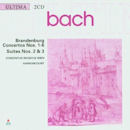
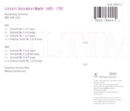 |
|
Brandenburg Concertos BWV 1046-1051 [20:21, 12:02, 11:54, 16:07, 22:00, 17:16]
Orchestral Suite No. 2 in B minor, BWV 1067 [24:04]
Orchestral Suite No. 3 in D major, BWV 1068 [23:46] |
|
Nikolaus Harnoncourt |
|
Concentus Musicus Wien |
|
- |
|
Teldec |
Jan 1981 [BC]
Dec 1983 [OS] |
2-CD / TT: 147:39
10-CD / TT: |
|
Recorded at Groß Tonstudio Rosenhügel, Vienna, Austria [BC] & Casino Zögernitz, Vienna, Austria.
2nd recording of Brandenburg Concertos BWV 1046-1051 by N. Harnoncourt.
Buy this album at:
2-CD: Amazon.com | Amazon.com
10-CD: Amazon.com
CD [3,5,6]: Amazon.com | Amazon.com
CD [1,2,4]: Amazon.com | Amazon.com |
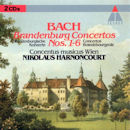


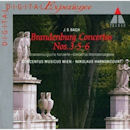



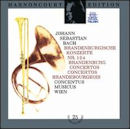
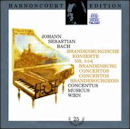
 |
|
Brandenburg Concertos by Nikolaus Harnoncourt at jsbach.org |
|
Francine Renee Hall wrote (July 17, 2003):
Below is a write-up of H's B's played on video (which I own). Notice how many of the period instruments are difficult to play, according to the writer, and yet H. still bravely pulls it off, in key or off-key....
Personally I don't 'hear' much that sounds 'off'. I'd have to play CD's with different pitches one after another to notice.
http://www.jsbach.org/brandenburgat.html |
|
Bradley Lehman wrote (July 17, 2003):
[To Francine Renee Hall] I'm amused by this paragraph from the review:
"WATCH THE WHOLE HARPSICHORD CADENZA IN CONCERTO NO 5!
Herbert Tachezi is excellent in Concerto No5! The camera gets close and looks 'over his shoulder' and you watch him play the whole cadenza up close! The harpsichord is a double manual and the top keys 'play' as the lower keys are played- so you can watch two things at once- the player on the lower keyboard and the top keys 'playing' too! Highly recommended!"
Reminds me of the old "The Far Side" comic strip. Two cowboys are crouched behind their covered wagons as flaming arrows are coming at them and winning the battle. One says to the other: "Hey, they're lighting their arrows! Can they DO that?" |
|
Francine Renee Hall wrote (July 17, 2003):
[To Bradley Lehman]
LOL-- yes, the writer seemed a bit naive; but do you think that 'pitch control' is used in recordings as he suggested?
P.S. About fire, did you see the discovery segment on Byzantium's 'flame throwers'? It saved Constantine's culture for another 500 years.
P.S.S. I'm playing some reggae now by a group I never knew, 'Steel Pulse'.... |
|
Bradley Lehman wrote (July 17, 2003):
Francine Renee Hall wrote:
< LOL-- yes, the writer seemed a bit naive; but do you think that 'pitch control' is used in recordings as he suggested? >
Digitally raising or lowering a pitch in an existing recording? Yes, it's used; but more often in pop recordings than classical. In pop recordings that are multi-tracked and then mixed later, anything goes. Sometimes the people who perform in the same piece don't even meet one another. In classical it's rarer to multi-mike like that or to mess with it so much. But I've seen it done. Years ago I was helping a friend edit a CD, and was there on a day when the singer and engineer were adjusting some notes in a piece for unaccompanied voice. The singer had had a cold during the recording sessions, and wanted to fix some things.... It did sound better after the digital surgery.
And I have a recording of the Brahms horn trio done with period instruments: I asked the hornist about it when I met him some years later. He complained that the engineers and producer had done much too much cleanup of the recording, taking out the breaths and other little noises that are a natural part of playing music. I agree, the resulting recording sounds too sanitized, unnatural. It's lovely, but it doesn't seem real. There's no way the piece can be played that cleanly in a concert, using ANY instruments. But, such is the expectation of modern listeners to recordings that everything will be "perfect"....
Another trick (but a good one) during a recording session is to record several minutes of silence: the room ambience with the performers sitting and standing in position but doing nothing. That silence can then be used for the spaces between tracks on the CD. A real, normal silence as opposed to the deathly absolute silence of blank digital tape. It makes a subtle difference.
< P.S. About fire, did you see the discovery segment on Byzantium's 'flame throwers'? It saved Constantine's culture for another 500 years. >
I don't have cable. What was the gist of the program? |
|
Francine Renee Hall wrote (July 17, 2003):
[To Bradley Lehman] Thanks for your interesting reply concerning altering pitch in recordings!
The gist of "Flame Throwers" (on the Discovery program) was to re-enact the actual conditions from history books illustrating Constantine's engineers who developed a method to do away with the hundreds of ships coming at them from the Ottomans. A Christian refugee placed a hearth at the bottom of each of their ships to heat crude oil which was then pumped through a long metal tube. With handles attached like a gunner, there was great manueverability, and the extreme pressures created caused the flames to be shot out at 30 feet or more. Hence the Ottoman's demise. However, it was great fun to watch today's experts re-anact the scenes. They were scared to death, and rightly so, because everyone could be incinerated immediately. So they wore fire suits, had a fire truck and firemen nearby in case of emergency. They had to shorten the projectile due to leaks, but it finally worked. And to think the original warriors had no such luxuries and achieved victory is quite
amazing.
The Discovery program has a wonderful series where they gather scientists and experts to 'prove' or 'disprove' famous events in history. Included were the Boston Massacre, Valley Forge, the USS Maine, etc. Most of the events as depicted in traditional history books were debunked, of course. |
|
Gene Hanson wrote (July 18, 2003):
Bradley Lehman wrote:
< And I have a recording of the Brahms horn trio done with period instruments: I asked the hoabout it when I met him some years later. He complained that the engineers and producer had done much too much cleanup of the recording, taking out the breaths and other little noises that are a natural part of playing music. I agree, the resulting recording sounds too sanitized, unnatural. It's lovely, but it doesn't seem real. There's no way the piece can be played that cleanly in a concert, using ANY instruments. But, such is the expectation of modern listeners to recordings that everything will be "perfect".... >
Would a listener sitting in a concert hall hear that breathing?
I know what you mean, though. I was listening last night to Jaqueline Du Pre and Daniel Barenboim's performance of the Beethoven Cello Sonatas, and I found the occasional coughing (not too intrusive) pleasing rather than distracting because it enhanced the feeling of listening to a live performance in a concert hall. |
|
Uri Golomb wrote (July 18, 2003):
Here's another example of recording producers spoiling a deliberate "inaccuracy". It's from an interview with fortepianist Malcolm Bilson (in Bernard Sherman's Inside Early Music, p. 309):
"I very much believe in the left hand not knowing what the right hand does, and I try to do this in Mozart. In one of hte Mozart concertos I recorded with John Eliot Gardiner, in the middle section of the slow movement I made a great effort to realize this: the orchestra was playing a beautiful, lilting accompaniment, and I was wandering around and weaving in and out. But in the finished product you don't hear much of it. I think that what happened wat that when they were editing teh tapes they threw all those takes out because they werent together!" (BTW, Bilson refused to tell Sherman which concerto it was)
Clearly, Bilson was not present in the editing sessions (which is why he has to speculate about what hapenned there). Ideally, performing artists should make every effort to attend these sessions, and ensure (as much as humanly possible, of course) that the finished product reflects their interpretation. I know that some performers do insist on this. In the case of a concerto, it's probably impossible to have everyone there; but at least the conductor and soloist should be present. I wonder if Gardiner was there... and to what extent he was responsible for not defending Bilson's interpretation. |
|
Bradley Lehman wrote (July 18, 2003):
<< And I have a recording of the Brahms horn trio done with period instruments: I asked the hornist about it when I met him some years later. He complained that the engineers and producer had done much too much cleanup of the recording, taking out the breaths and other little noises that are a natural part of playing music. I agree, the resulting recording sounds too sanitized, unnatural. It's lovely, but it doesn't seem real. There's no way the piece can be played that cleanly in a concert, using ANY instruments. But, such is the expectation of modern listeners to recordings that everything will be "perfect".... >>
< Would a listener sitting in a concert hall hear that breathing? >
Yes, and creaking music stands and chairs, and page turns, and the hornist occasionally flipping the horn all the way around to dump saliva out of it, and more. And that's not even taking into account anything the audience might do, or sounds coming from outside the hall. Or any shuffling around between the movements.
I know of a harpsichord piece by a modern composer that has a loud page turn specified in the score as part of the piece. ("Snap the page loudly" or some such marking, I don't remember the exact wording.) And then on the next page there is only one bar of music, printed in a large font, and that's the end of the piece. A nice little joke on harpsichordists who DON'T put their page turns at musically appropriate places! |
|
Robert Sherman wrote (July 18, 2003):
[To Francine Renee Hall, in reponse to her original message] Interesting. A fun review, unpretentious and basically accurate even though the reviewer apparently is unaware that thumb holes in trumpets are not authentic. Incidentally, I have on vinyl a different old Harnoncourt Bburg, not sure of the year, but Ed Tarr is the trumpeter and he does quite well, considering.
Tarr, incidentally, attended Oberlin some years before I did. Before he had his worldwide reputation, the memory of him at Oberlin was that he played the Bburg "like a God" (this was on an early valve piccolo trpt) but wasn't particularly good at the big-bore Romantic-period stuff. This was unusual since at that time most players were the reverse. |
|
Robert Sherman wrote (July 18, 2003):
[To Gene Hanson] IMO they're very different.
With a wind instrument, and even more so with a singer, the intake of breath is a natural part of the music making and can actually add to the phrasing. I've read an interview with Kathleen Battle in which she talks about how she went nuts trying to suppress her audible intakes, before she realized there's nothing wrong with hearing them. Most melodic lines are written with natural luftpauses, and a bit of air intake noise there adds to the demarcation.
But as far as coughing is concerned, IMO that's pure distraction. Sure it can add to the feeling of being at a real concert, but so can the sound of a diesel truck jake-braking down the hill outside the hall. I'd rather do with out it. |
|
Matthew Neugebauer wrote (July 18, 2003):
Robert Sherman wrote:
< But as far as coughing is concerned, IMO that's pure distraction. Sure it can add to the feeling of being at a real concert, but so can the sound of a diesel truck jake-braking down the hill outside the hall. I'd rather do with out it. >
haha on the Mass in B min recording from hell (the Giulini), among the many atrocious things that make it the worst Bach recording ever, someone has a cough all the way through, and I think either the person is sitting near the front or part of the off-tempo choir!
Matt
(who hasn't bashed that recording in a while) |
|
Gene Hanson wrote (July 18, 2003):
Bradley Lehman wrote:
< Yes, and creaking music stands and chairs, and page turns, and the hornist occasionally flipping the horn all the way around to dump saliva out of it, and more. And that's not even taking into account anything the audience might do, or sounds coming from outside the hall. Or any shuffling around between the movements.
I know of a harpsichord piece by a modern composer that has a loud page turn specified in the score as part of the piece. ("Snap the page loudly" or some such marking, I don't remember the exact wording.) And then on the next page there is only one bar of music, printed in a large font, and that's the end of the piece. A nice little joke on harpsichordists who DON'T put their page turns at musically appropriate places! >
You're hearing must be a lot better than mine. I have never heard breathing, nor page turning, nor the sound of a horn flipping or saliva dripping. I suppose I might hear a snap if a page turner really worked at it, but all those other sounds are beyond my poor deteriorating range of hearing, especially in the high frequencies (and were even beyond it in my younger days). Dogs and women, I understand, have better hearing, but I can't speak for them.. |
|
Gene Hanson wrote (July 18, 2003):
Robert Sherman wrote:
< But as far as coughing is concerned, IMO that's pure distraction. Sure it can add to the feeling of being at a real concert, but so can the sound of a diesel truck jake-braking down the hill outside the hall. I'd rather do with out it. >
Well, there's really no comparison, at least on these disks. Ordinarily I do find cougning a distraction, but oddly not here. |
|
Gene Hanson wrote (July 18, 2003):
Matthew Neugebauer wrote:
<< But as far as coughing is concerned, IMO that's pure distraction. Sure it can add to the feeling of being at a real concert, but so can the sound of a diesel truck jake-braking down the hill outside the hall. I'd rather do with out it. >>
< haha on the Mass in B min recording from hell (the Giulini), among the many atrocious things that make it the worst Bach recording ever, someone has a cough all the way through, and I think either the is sitting near the front or part of the off-tempo choir! >
Sounds like they should have done some electronic editing on that one. |
|
Matthew Neugebauer wrote (July 18, 2003):
Gene Hanson wrote:
< Sounds like they should have done some electronic editing on that one. >
yeah-it's called the "delete" button
Matt
(who will stop bashing this recording, as his point is made clear-not like anyone would disagree with his opinion as to the quality of this recording,
but....) |
| |
|
Harnoncourt and Brandenburg 1 |
|
Neil Halliday wrote (December 19, 2003):
I heard this recording on the radio today. (Is it the only one (this is on Teldec) from Harnoncourt?)
This is a relaxed, flowing, and very enjoyable performance from the CMV, with remarkably 'in tune' playing from the horns.
In one or two places in the romantic (if imbued with sadness) slow movement, Harnoncourt threatened to destroy the mood with some strange accents, but in the end the music came through unscathed.
Overall, this is a performance with loads of character.
(Less successful was an excerpt from Handel's Messiah - "Behold, the Lamb of God". Here Harnoncourt was back to his trick of introducing a hiatus after every second syllable in the vocal and instrumental parts, thereby destroying the flow, and impact, of the music.) |
|
Bradley Lehman wrote (December 19, 2003):
[To Neil Halliday] There are two complete sets of the Brandenburgs by Harnoncourt: one from the early 1960s and the other from the early 1980s. And, as far as I know (but without seeing it, so I'm not sure) there is also a videotape/DVD performance that is different from both of those.
Neil, in your review below: the way you have written it, why do you make it sound so negative even when you are saying you *liked* it? Harnoncourt has failed to disappoint you (and failed to scathe or destroy the music) in the way you expected him to do!...as if his goal was to tork you off with his choices, to threaten to ruin the music at every turn, but then he thwarted your fears by doing something more musically palatable? You sound astonished that Harnoncourt could do anything intelligent or satisfying. Why not simply write up your reactions *positively* and straightforwardly, instead of couching them as an oblique Harnoncourt-bash where he has failed (once again) to suit your expectations, in this case by delivering *better* results than you expected?!
Anyway...personally I like the 1980s set much better than the earlier one; as I mentioned here a few days ago it was one of my favorite Bach acquisitions this year. The players have better technical command of their instruments, and the performances are much more focused with strong Affekt (whereas the earlier one gives an impression of just barely getting through the notes accurately). Richard Taruskin also praised this latter set, which was new when he wrote the essays reproduced in his book Text and Act. With this set he drew a parallel with the musical approach of Furtwangler: not directly in the way Furtwangler himself conducted Bach, but rather in the musical goals that appear to be shared here. Again, it's the strong mood and the flexibility, and the relaxed phrasing that lets the music emerge with spontaneity. Taruskin contrasts it with the "geometric" approach of almost everybody else.
I'd urge everybody to hear this later Harnoncourt set, and Leonhardt's (among many others, of course). It is interesting to hear where both of these musicians have come out during and after their long project of recording all the cantatas. Leonhardt's is from 1976-77, in the middle of the cantatas cycle. And their approaches are vastly different from one another, both in the vocal works and here.
And compare all of this with their very first recording of anything on period instruments: the Bach cantatas BWV 54 and BWV 170 and the "Agnus Dei" of the B Minor Mass (BWV 232), with Alfred Deller singing, the group of players (including Harnoncourt) who would soon form Concentus Musicus Wien, directed by Leonhardt from the organ. May 1954. I consider this an essential recording for anyone who wishes to understand the artistry of these remarkable musicians...and their wives, who are both part of this ensemble for the recording. And, it will soon be 50 years! Mrs Alice (Hoffelner) Harnoncourt and Mrs Marie Leonhardt were the leading violinists regularly in their ensembles, although the men got most of the credit...I suspect their own influence has been grossly underestimated by listeners to the recordings, and by marketers.
(Incidentally, I have another CD by Marie Leonhardt leading her own ensemble in chaconnes by various people, recorded in 1990-91. Again, very fine. And the ensemble included young Egarr and Manze!)
Additionally, as I have mentioned sometime before, Nikolaus Harnoncourt himself was a player in #6 of the Felix Prohaska set of Brandenburgs, recorded in the 1950s.
As for Harnoncourt's recording of "Messiah", I like it very much despite the fractured English pronunciation of the Swedish choir and some of the soloists. My favorite bit is the "He was despised" aria...a gorgeous performance. |
| |
|
Brandenburg Concertos BWV 1046-1051 : Details
Recordings:
Reviews of Individual Recordings: Güttler’s Brandenburgs | Review: Brandenburg Concertos Nos. 1, 2 & 5 - conducted by Karl Richter | Review of Brandenburg Concertos by Tafelmusik
General Discussions: Part 1 | Part 2 | Part 3
Discussions of Individual Recordings: Brandenburg Concertos - R. Alessandrini | Brandenburg Concertos - R. Egarr | Brandenburg Concertos - N. Harnoncourt | Brandenburg Concertos - O. Klemperer |
|
Nikolaus Harnoncourt : Short Biography | Concentus Musicus Wien Recordings of Vocal Works: Part 1 | Part 2 | Part 3 | Part 4
Discussions of Vocal Recordings: Harnoncourt - Glorious Bach! (DVD) | Motets - N. Harnoncourt | BWV 232 - N. Harnoncourt | BWV 244 - N. Harnoncourt | BWV 245 - N. Harnoncourt-H. Gillesberger | BWV 248 - N. Harnoncourt
General Discussions: Part 1 | Part 2 | Part 3 | Part 4 | Part 5 | Part 6 | Part 7 | Part 8
Table of recordings by BWV Number
Discussions of Instrumental Recordings: Brandenburg Concertos - N. Harnoncourt |
|
|